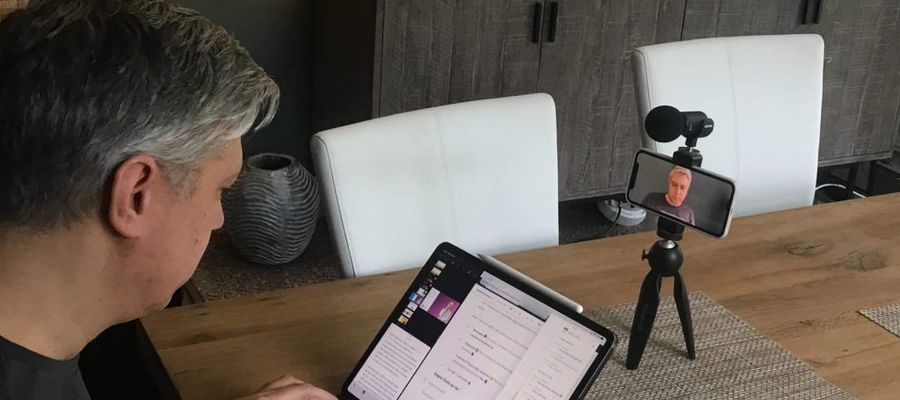The Covid-19 crisis has forced even the most resistant of businesses to adapt and embrace home working. The Pandemic is fast-tracking digital transformation with virtual working becoming the new normal. Without the physical workspace, how do we ensure we continue to be productive during these unprecedented times? Which apps for home working are the best for keeping the team together?
Haider Iman, Founder and Director of Tao Leadership, a startup behaviour change consultancy, has been experimenting with his team on ways to make remote working extra human. Rather than write about finding a comfortable working environment, a dedicated work space etc, he shares his thoughts with us on the HOW of remote work.
This is the first of 2 posts. In this blog we will explore apps and tools that enable productive home working by maintaining the flow of communication. In the second part, we will explore creatives ways these apps can be used to encourage full team engagement and safeguard their wellbeing by embracing their 'whole selves' and not just their 'work selves'.
Iman explains: "Remote work can produce 'deep work' which can result in massive productivity. But what can suffer are the following:
Belonging (I'm seen, I'm heard, I'm in sync, I'm valued) vs. Loneliness/Isolation
Alignment (we're nailing the right things together) vs. Left hand/right hand syndrome
Unplanned Watercooler moments that lead to Insight & Innovation vs. departmental/organisational silos
Fun vs. zero 'craic'"
Apps & Tools for Home Working
Tao Leadership have researched several staple tools to assist them whilst remote working. Many of the apps are free, or have a free option or trial. All are geared towards making working together on digital platforms as easy as (or even easier than) being in the room together.
"We tailored own productivity stack as follows:
Zoom - We were early adopters & never looked back. Its rock solid compared to other platforms. They offer a free plan for 40 min meetings.
Notion - This is an ‘All-in-One’ work space - a very flexible wiki with many templates for sharing info. Free plans are available.
Sketchtogether - This is a good real time collaborative whiteboard. This does have a cost but only £0.99 per month. Also includes audio & video (although we have not tried those aspects yet).
Slack - We've been using for many years. We tried to move to Teams for 6 months, then moved back. Currently, in my opinion, it is the best out there, however it can be a distraction when not set up & controlled well. A free plan is also available for this platform.

Calm - A cool meditation app. They offer a team membership option.
Your phone - Don’t underestimate the intimacy of a text or whatsapp message
Your desktop/laptop/tablet & calendar - The basics to get 💩 done
Stylus/ApplePencil - These can be very handy"
Depending on your job role, business and industry, some of these may be more applicable than others.
Keeping the Dialogue Going - New stuff they're trying
So now you have the toolkit, what do you do with it? Without putting some thought into how you're going to use the platforms you won't get the best out of them. The goal is to maintain a 'team' ethos. If the conversation between a team slides into individuals working in a more solitary manner it can be detrimental to motivation. Haider shared some of his ideas to combat this...
The most typical application for Zoom is meetings. But without the usual cues for when someone is due to speak it can be tricky not talking over one another. "There can be up to 11 of us in a meeting. So we tried out some experimental meeting rules: only a small number were allowed to talk at any one time, signified by wearing a hat. When someone wanted to talk, they put on a hat & one person had to remove their hat to make room. Wasn’t perfect but was interesting."

It isn't just for meetings though. When you think of it less formally, it can be like just being with other people.
To build and maintain relationships with colleagues you could "rotate 10 min check ins with each other daily - do a get to know each other, brainstorm together or a shared whiteboard".
Try to creating a virtual 'breakout' space."You can install Zoom on multiple devices. Try having a drop-in channel where people can stay on and speak to whoever joins. An ‘always on’ zoom room."
Or you could try this to emulate an office environment. "Being on a video call while each person is working but they can see each other. It is virtual working side by side - doesn’t need to be on the same task - just being together, doing your thing. Another idea is to have a buddy for a day - which can change each day."
Any why not have some fun with it while you're at it? "Many of us are uploading virtual backgrounds on Zoom - some more nutty than others!"

"Setting defined breaks can be a good idea. Break up the stretches before and after lunch with an 11am and 3pm break. Or perhaps use the pomodoro technique and set alarms to pause. You could even instate a shared break. This could be the full team all go for a walk at the same time or perhaps doing something social together in the break time once or twice a day"
"Every Monday at 9.30am the whole team checks in on Zoom for 30 mins. Each team member expresses gratitude for someone/something in their life. Then every Friday at 4pm the whole team checks out on Zoom for 30 mins. Each team member shares something they’re proud of themselves for from the week, and someone in the team they’re particularly grateful to."
To some this is time not spent 'on-task' and therefore not productive but Haider feels quite to the contrary. Apps for home working should not just be for the 'work' element. "These check in rituals are the times where they tell stories, remind themselves of their purpose & vision, our behaviours, connect & nurture each other and create psych safety."
Check back for part 2 about how these apps can be further used for nurturing the well-being of your team during these testing times.
More about Haider

Haider Iman is Founder and Director of Tao Leadership, a startup behaviour change consultancy. Tao leads its field with a fusion of analytics, tech & psychology for cultural transformation in just 12 weeks. Tao’s behaviour change programmes have won international awards for clients such as Sky, Accenture, Boston Consulting Group, Npower, and Domestic & General and generated more than £50 million in client-measured ROI in the last two years alone. Though Tao is a micro-enterprise with just ten employees, it has twice been runner up in the CIPD’s ‘Best Consultancy’ category, winning over global firms with thousands of employees. Find out more at TeamTao.uk. Author of the bestselling book, ‘Straight to Yes!’ Haider is also a former UK Sales Trainer of the Year, Systemic Team Coach, NLP Trainer, musician, & Geordie.


